CVA and COVID-19

We hope that you are all staying well in these uncertain times. As COVID-19 continues to spread around the world, it seems every community will be touched in some way – whether directly by the virus or by the economic and other impacts it is having.
There has been a significant amount of discussion across the CALP Network on what the pandemic means for the use of CVA and for the operations of CALP members.
Guidance and resources
- The CALP Network live COVID and CVA guidance (available in Arabic, French, Spanish), which summarizes key points from guidance across the different actors of the network and is updated regularly.
- Collection of resources (full list to consult), learning and questions here, thank you for continuing to share!
- Other useful resources and links here below.
Main image credit: Columbia University in the City of New York
Featured content

CVA in COVID-19 Contexts: Guidance from the CALP Network
Guidelines and Tools
This is a summary of the key points from the many resources you shared on CVA and COVID through this document. This is a living document and we will continue to update this summary as new resources are added. The below is intended to help organisations understand and prepare for likely impacts of COVID-19 on their work, consider whether CVA is right for the contexts in which they operate and...

Mercy Corps Tipsheet: COVID-19 and CVA
Guidelines and Tools
This tipsheet serves as guidance to help field teams think through different ways to mitigate the spread and impact of Covid-19 through ongoing cash and voucher assistance (CVA), inform the adaption of CVA programming in the context of Covid-19, and promote sensitivity to changing market dynamics and prices.
This tip sheet is general, but we are ready to work with you to tailor advice to your...

ICRC Tipsheet: Cash and Voucher Assistance and COVID-19
Guidelines and Tools
This tipsheet serves as guidance to help field teams think through different ways:
1) to mitigate the spread of COVID-19 through ongoing Cash and Voucher Assistance (CVA);
2) inform the adaptation of CVA in the context of COVID-19;
3) promote sensitivity to evolving markets dynamics.
This tipsheet is inspired by the “Shield & Sword strategy” developed to tackle previous outbreaks such as...
Latest

Adaptation of Operational Activities to Humanitarian Crises – COVID-19 pandemic
Report
Turkish Red Crescent’s (TRC) Kızılaykart Cash Based Assistance Programmes Coordinatorship continues to work relentlessly with the aim to develop shock-responsiveness and continue to alleviate human suffering caused by conflicts, involuntary migration and socioeconomic challenges in the face of the...

The use of cash assistance in the Covid-19 humanitarian response: accelerating trends and missed opportunities
Report
When COVID struck, governments and humanitarians turned to cash assistance to help people. To what extent was CVA used, and how did it impact on ways of working? See CALP’s analysis published in ODI's Disasters Journal, with inputs drawn from across the CALP Network.
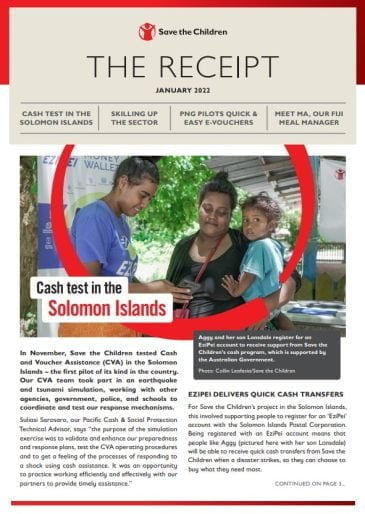
The Receipt
Report
Save the Children Australia: Pacific Cash Preparedness and Response Program Newsletter

Niger: Providing cash transfers for vulnerable people living with HIV and key populations
Case Study
In 2020, WFP and UNAIDS piloted a joint initiative to mitigate the socio-economic impact of COVID-19 on marginalized populations often left behind by providing cash transfers to vulnerable people living with HIV, key populations and their households in Burkina Faso, Cameroon, Côte d’Ivoire and Niger....

Providing Cash Transfers for Vulnerable People Living with HIV and Key Populations
Report
In 2020, WFP and UNAIDS piloted a joint initiative to mitigate the socio-economic impact of COVID-19 on marginalized populations often left behind by providing cash transfers to vulnerable people living with HIV, key populations and their households in Burkina Faso, Cameroon, Côte d’Ivoire and Niger....
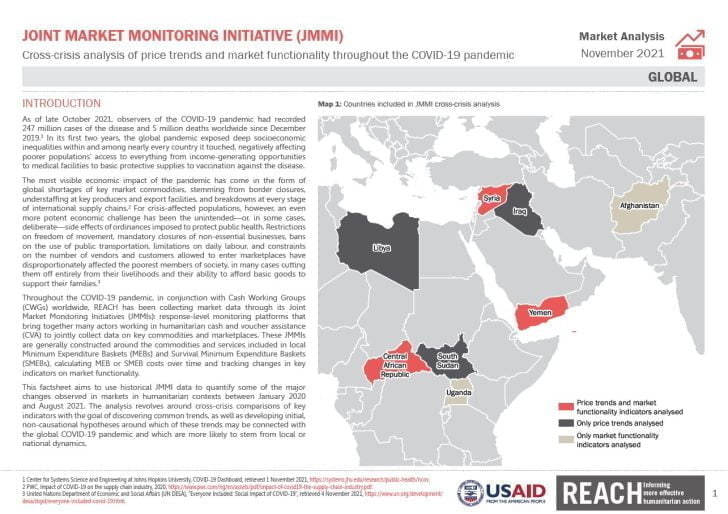
Joint Market Monitoring Initiative (JMMI): Cross-crisis analysis of price trends and market functionality throughout the COVID-19 pandemic
Report
Throughout the COVID-19 pandemic, in conjunction with Cash Working Groups worldwide, REACH has been collecting market data through its Joint Market Monitoring Initiatives (JMMIs): response-level monitoring platforms that bring together many actors working in humanitarian CVA to jointly collect data on key...

Cash and Voucher Assistance (CVA) in COVID-19 context: Case studies from Nepal
Case Study
With the first and second surge of COVID-19 pandemic in Nepal, followed by lockdown with mobility restrictions imposed by the government to reduce the spread of the virus, most vulnerable people witnessed impacts on their lives and livelihoods-affecting food security, health and nutrition, and education,...
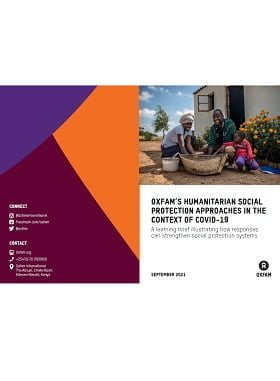
Oxfam’s humanitarian social protection approaches in the context of COVID-19
Report
A learning brief illustrating how responses can strengthen social protection systems
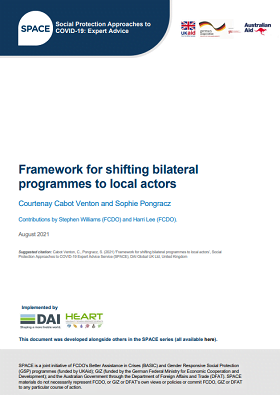
SPACE Framework for shifting bilateral programmes to local actors
Guidelines and Tools
This document presents an initial framing developed to support analysis of separation of functions, Value for Money and risk, to help facilitate a shift from UN/INGO led programmes, to locally-led models that draw on the complementarities between UN, INGO and LNO key strengths. It also reports on the...

SPACE Direct support to local actors: considerations for donors
Guidelines and Tools
The COVID-19 crisis has highlighted the critical role of local actors, including governments, and local and national NGOs, in the design and delivery of programming. Movement restrictions and a rapid scale-up of humanitarian and social protection assistance to new populations have driven a greater focus...
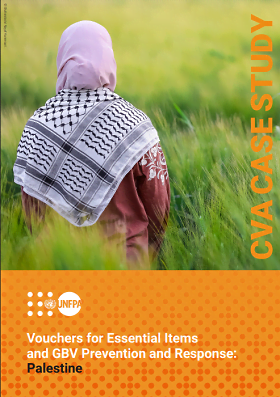
Vouchers for Essential Items and GBV Prevention and Response: Palestine
Report
The COVID-19 pandemic increased the risk of gender-based violence (GBV) for women and girls in Palestine. Women reported to UNFPA that diminished economic opportunities and financial stress significantly contributed to this increased risk. In response, UNFPA provided vouchers to respond to the urgent...
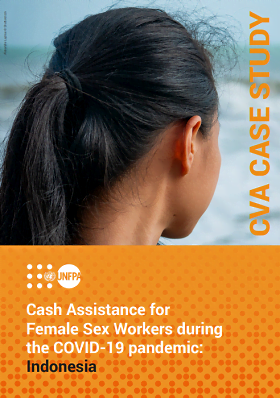
Cash Assistance for Female Sex Workers during the COVID-19 pandemic: Indonesia
Report
The COVID-19 pandemic heavily impacted sex workers in Indonesia: their incomes decreased dramatically, they encountered greater difficulty accessing healthcare, and many of them could not access the government cash assistance that was set up to help Indonesians during the pandemic. This CVA pilot provided...
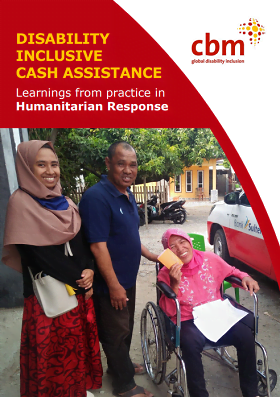
Disability Inclusive Cash Assistance: Learnings from Practice in Humanitarian Response
Guidelines and Tools
This case study collection describes lessons learned from seven inclusive humanitarian cash transfer projects implemented from 2015 – 2020 in Niger, Zimbabwe, Pakistan, Bangladesh, Philippines, and Indonesia, and five ongoing projects from the 2020 Covid-19 pandemic responses. This good practice...
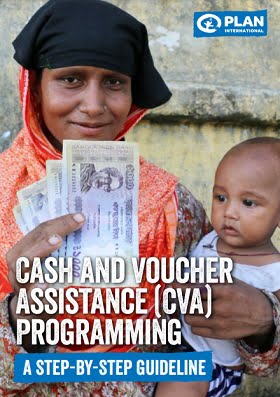
Cash and Voucher Assistance (CVA): A Step by Step Guidelines
Guidelines and Tools
The purpose of this guideline is to increase knowledge around CVA in applying the CVA approaches wherever appropriate, instead of referring to traditional in-kind assistance. It refers to the technical concept of CVA as well as to the operational management of CVA components. Trends and perspectives of...

We Don’t Do a Lot for Them Specifically
Report
Cash based assistance is a large part of government and NGO responses to social protection needs during the COVID-19 crisis. But is this assistance reaching people with diverse SOGIESC (aka LGBTIQ+ people). There are clear needs, borne of systemic discrimination, including loss of informal sector work,...

We Don’t Do a Lot for Them Specifically – Quick Guide
Report

How to promote better nutrition through social assistance – A guidance note
Guidelines and Tools
This guidance is intended to inform the design or adaptation of the following social assistance interventions to make them more nutrition-sensitive (see Box 1): cash transfers, cash-plus, in-kind transfers, school feeding, and public works programmes.

IOM Cash-Based Interventions Annual Report and Case Studies 2020
Case Study
The IOM Cash-Based Interventions (CBI) Annual Report and Case Studies 2020 features case studies from a large number of missions that implemented CBI in 2020 and highlights the increasing use of cash and voucher assistance in IOM, reaching more than 1.6 million beneficiaries in 56 countries. The case...
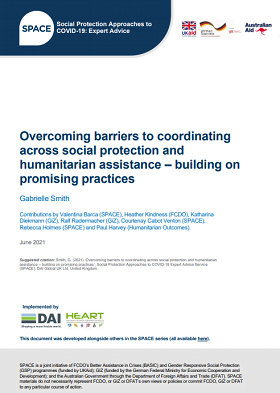
SPACE Overcoming barriers to coordinating across social protection and humanitarian assistance – building on promising practices
Policy paper
The importance of strong coordination between actors preparing, designing and implementing shock responses is well accepted. This has been highlighted specifically concerning shock responsive social protection (SRSP) as well as linking humanitarian action and social protection (HA-SP). However, despite...
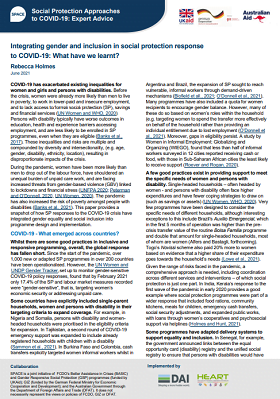
Integrating gender and inclusion in social protection response to COVID-19: What have we learnt?
Policy paper
COVID-19 has exacerbated existing inequalities for women and girls and persons with disabilities. During the pandemic, women have been more likely than men to drop out of the labour force, have shouldered an unequal burden of unpaid care work, and are facing increased threats from gender-based violence...


